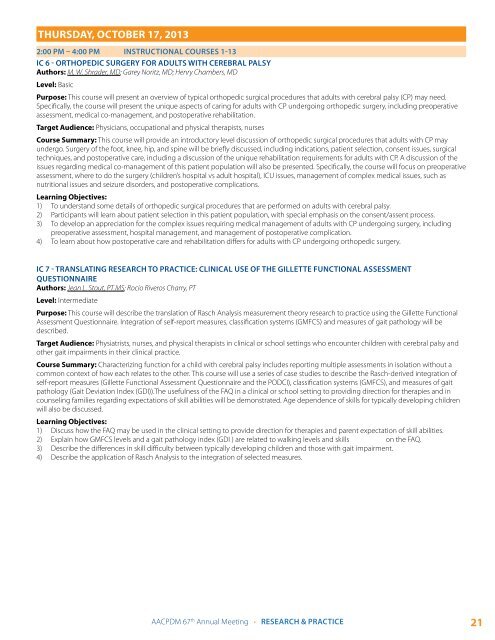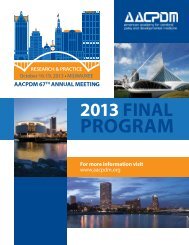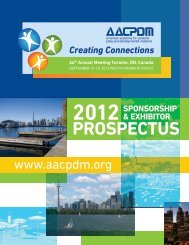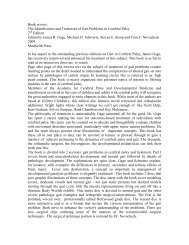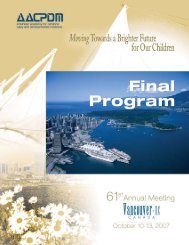program - American Academy for Cerebral Palsy and ...
program - American Academy for Cerebral Palsy and ...
program - American Academy for Cerebral Palsy and ...
Create successful ePaper yourself
Turn your PDF publications into a flip-book with our unique Google optimized e-Paper software.
Thursday, October 17, 2013<br />
2:00 pm – 4:00 pm Instructional Courses 1-13<br />
IC 6 - ORTHOPEDIC SURGERY FOR ADULTS WITH CEREBRAL PALSY<br />
Authors: M. W. Shrader, MD; Garey Noritz, MD; Henry Chambers, MD<br />
Level: Basic<br />
Purpose: This course will present an overview of typical orthopedic surgical procedures that adults with cerebral palsy (CP) may need.<br />
Specifically, the course will present the unique aspects of caring <strong>for</strong> adults with CP undergoing orthopedic surgery, including preoperative<br />
assessment, medical co-management, <strong>and</strong> postoperative rehabilitation.<br />
Target Audience: Physicians, occupational <strong>and</strong> physical therapists, nurses<br />
Course Summary: This course will provide an introductory level discussion of orthopedic surgical procedures that adults with CP may<br />
undergo. Surgery of the foot, knee, hip, <strong>and</strong> spine will be briefly discussed, including indications, patient selection, consent issues, surgical<br />
techniques, <strong>and</strong> postoperative care, including a discussion of the unique rehabilitation requirements <strong>for</strong> adults with CP. A discussion of the<br />
issues regarding medical co-management of this patient population will also be presented. Specifically, the course will focus on preoperative<br />
assessment, where to do the surgery (children’s hospital vs adult hospital), ICU issues, management of complex medical issues, such as<br />
nutritional issues <strong>and</strong> seizure disorders, <strong>and</strong> postoperative complications.<br />
Learning Objectives:<br />
1) To underst<strong>and</strong> some details of orthopedic surgical procedures that are per<strong>for</strong>med on adults with cerebral palsy.<br />
2) Participants will learn about patient selection in this patient population, with special emphasis on the consent/assent process.<br />
3) To develop an appreciation <strong>for</strong> the complex issues requiring medical management of adults with CP undergoing surgery, including<br />
preoperative assessment, hospital management, <strong>and</strong> management of postoperative complication.<br />
4) To learn about how postoperative care <strong>and</strong> rehabilitation differs <strong>for</strong> adults with CP undergoing orthopedic surgery.<br />
IC 7 - TRANSLATING RESEARCH TO PRACTICE: CLINICAL USE OF THE GILLETTE FUNCTIONAL ASSESSMENT<br />
QUESTIONNAIRE<br />
Authors: Jean L. Stout, PT MS; Rocio Riveros Charry, PT<br />
Level: Intermediate<br />
Purpose: This course will describe the translation of Rasch Analysis measurement theory research to practice using the Gillette Functional<br />
Assessment Questionnaire. Integration of self-report measures, classification systems (GMFCS) <strong>and</strong> measures of gait pathology will be<br />
described.<br />
Target Audience: Physiatrists, nurses, <strong>and</strong> physical therapists in clinical or school settings who encounter children with cerebral palsy <strong>and</strong><br />
other gait impairments in their clinical practice.<br />
Course Summary: Characterizing function <strong>for</strong> a child with cerebral palsy includes reporting multiple assessments in isolation without a<br />
common context of how each relates to the other. This course will use a series of case studies to describe the Rasch-derived integration of<br />
self-report measures (Gillette Functional Assessment Questionnaire <strong>and</strong> the PODCI), classification systems (GMFCS), <strong>and</strong> measures of gait<br />
pathology (Gait Deviation Index (GDI)).The usefulness of the FAQ in a clinical or school setting to providing direction <strong>for</strong> therapies <strong>and</strong> in<br />
counseling families regarding expectations of skill abilities will be demonstrated. Age dependence of skills <strong>for</strong> typically developing children<br />
will also be discussed.<br />
Learning Objectives:<br />
1) Discuss how the FAQ may be used in the clinical setting to provide direction <strong>for</strong> therapies <strong>and</strong> parent expectation of skill abilities.<br />
2) Explain how GMFCS levels <strong>and</strong> a gait pathology index (GDI ) are related to walking levels <strong>and</strong> skills on the FAQ.<br />
3) Describe the differences in skill difficulty between typically developing children <strong>and</strong> those with gait impairment.<br />
4) Describe the application of Rasch Analysis to the integration of selected measures.<br />
AACPDM 67 th Annual Meeting • Research & Practice 21


